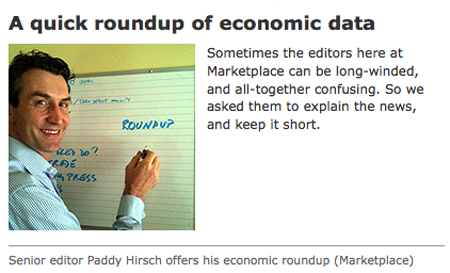
When you listen to Marketplace, American Public Media‘s finance-focused show, you generally expect to hear expert, and even entertaining, takes on the day’s economic news. On Wednesday’s show, though, the typical quick-and-dirty met…quick-and-funny. Marketplace offered a segment pretty much summarizing the world financial situation…in pretty much three sentences. Listen to the whole thing — all two minutes of it — here; but the gist of it, per the transcript, is this:
Paddy Hirsch: People are worried about the local economy. They think gold is the safest investment, so that’s where they put their money.
I’m Paddy Hirsch for Marketplace.
Liza Tucker: Demand is way down for oil. That’s because some economies are shaky and countries aren’t using as much.
I’m Liza Tucker for Marketplace.
Ethan Lindsey: People are still scared about the economy. So no one wants to blow their savings on a house.
I’m Ethan Lindsey for Marketplace.
And the kicker, from host Kai Rysdall: “Y’know, it’s funny, our news spots are usually a whole lot longer than that. I’m not really sure what happened on those.”
Seriously, if you haven’t already, it’s worth a listen. It’s funny. Also, short. From the future-of-news approach, though: It’s also a pithy (“pithy,” in fact, might be too expansive a term for it) explanation of the financial doldrums the nation — and the world — are currently experiencing. Sure, the topics covered are the stuff of dissertations/post-graduate programs/think-tank white papers; but they’re also, more to the point, the stuff of everyday life. People need to understand it. As Celeste Wesson, Marketplace’s senior producer, told me: “We are always trying, as a show, to think of more interesting ways to tell business stories. That comes with the territory of covering business, economics, money, etc.: we want to look at how it affects people’s lives, but we also want to make sure that we’re really clear — and really entertaining.”
A Twitterfied take on the ongoing financial crisis: Clear? Check. Entertaining? Check.
The idea came in Wednesday morning’s editorial meeting, Wesson told me. Marketplace staffers were talking about one of the big financial stories of the day — oil prices — and how best to explain it to listeners, when Liza Tucker, the show’s senior Washington editor and resident sustainability expert, finally said: “It’s easy. Demand is down, and that’s because economies are in trouble, and countries aren’t using as much oil.” And “she said it in the meeting,” Wesson says, “as if to say, ‘This is not a complicated story here.'” But “she did it like this perfect little tiny news spot.”
Everyone laughed — but there was something to the joke, Wesson realized. “There’s something we can play with there”: clarity by way of brevity.
“And then someone said, ‘Yeah, but we can’t do just one. So maybe we can do a mini news report with a number of them.'”
“Yeah — we probably need at least three.”
“Maybe we could do gold.”
“Oh, yeah, that would be good.”
Et cetera. “So we had this little, inchoate idea floating around the morning meeting,” Wesson says — which crystallized throughout the day, as producers refined it, into a segment. They tapped Tucker, who’d come up with the initial, off-the-cuff gem, to participate in the final product; then Paddy Hirsch, an expert in gold markets; then Ethan Lindsey, who came up with that “perfectly deadpan way” of talking about home sales.
“Really, it’s a group process,” Wesson notes. “All of us know that one of the things we need to do is make sure that we’re taking complicated things and making them clear” — and to explode the formula that’s all too familiar among lay consumers of financial journalism: incomprehension leading to boredom (laced, often, with frustration).
One way to do that: go simple. Really simple. In this case, “It just struck us as funny that sometimes these things are simpler than we think they are,” Wesson says. “And wouldn’t it be fun, in the middle of August, to break this up with something that’s fun to listen to, and catches listeners by surprise?”